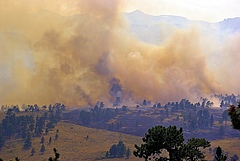Environmental stressors weaken ecosystem resistance to change

Drought and overgrazing are factors that can lead to degraded land (left) and impact the ability of ecosystems to provide services such as carbon sequestration or soil fertility. (Picture: USDA)

When terrestrial ecosystems are subjected to multiple degradation factors, such as fires, for longer periods, their ability to provide ecosystem services is affected. (Picture: M. Goad)
The higher the environmental stress, the lower the resistance to global change.
Based on a press release by Manuel Delgado-Baquerizo, Instituto de Recursos Naturales y Agrobiología de Sevilla (CSIC)
The international study, led by Spain’s IRNAS-CSIC with the Biodiversity and Ecosystem Functioning Laboratory (BioFunLab) and the German Center for Integrative Biodiversity Research (iDiv) Halle-Jena-Leipzig, analysed 1,023 global change experiments worldwide in collaboration with ten other international institutions.
“Terrestrial ecosystems are subject to a myriad of climate change and environmental degradation factors, including global warming, drought processes, atmospheric pollution, fires, or overgrazing, among many others,” explains Manuel Delgado-Baquerizo, BioFunLab leader and senior author of the paper.
These so-called global change factors impact the ability of ecosystems to provide services such as carbon sequestration or soil fertility, which are important for mitigating climate change and ensuring food production, respectively. The researchers’ analysis covered seven ecosystem services.
Overburdened ecosystems
The analysis shows that as the number of global change factors to which the ecosystems are subject increases, these ecosystems become more and more sensitive, reducing their natural capacity to resist the impacts of environmental perturbations.
Using 15 years of data from the Jasper Ridge Global Change Experiment in California, the study further found that this sensitivity is especially pronounced when the stress (for example, warming) is sustained over time, affecting the ecosystems’ ability to provide services.
“As various environmental changes interact and collectively reduce the stability of ecosystems, it becomes considerably more challenging for researchers to predict future ecosystem services,” explains Prof. Nico Eisenhauer from iDiv and Leipzig University.
In contrast, biodiversity showed a higher resistance to multiple global changes, with the researchers noting a less pronounced effect compared to ecosystem functions, explains Guiyao Zhou, first author of the paper, who is a former Humboldt Fellow at iDiv and a member of the BioFunLab.
“Our findings show that the sustainability of our ecosystems depends on reducing the number of global drivers of change associated with human activity,” Zhou concludes.
Original publication:
(Researchers with iDiv affiliation and alumni bolded)
Zhou, G., Eisenhauer, N., Terrer, C., Eldridge, D.J., Duan, H., Guirado, E., Berdugo, M., Zhou, L., Liu, S., Zhou, X., Delgado-Baquerizo, M. (2024) Resistance of ecosystem services to global change weakened by increasing number of environmental stressors. Nature Geoscience. DOI: doi.org/10.1038/s41561-024-01518-x
Contact:
Prof Dr Nico Eisenhauer
Head of the research group Experimental Interaction Ecology
German Centre for Integrative Biodiversity Research (iDiv) Halle-Jena-Leipzig
Leipzig University
Phone: +49 341 97 33167
Email: nico.eisenhauer@idiv.de
Web: www.idiv.de/en/groups_and_people/employees/details/eshow/eisenhauer_nico.html
Christine Coester
Media and Communications
German Centre for Integrative Biodiversity Research (iDiv) Halle-Jena-Leipzig
Email: christine.coester@idiv.de
